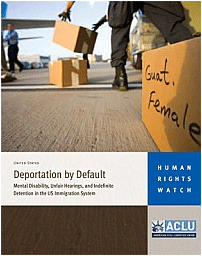This report was researched and written by Sarah Mehta, Aryeh Neier fellow at Human Rights Watch and the American Civil Liberties Union.
From the report summary:
The US immigration court system is complicated and adversarial at the best of times. But it may be particularly confusing for people with mental disabilities, who may find it hard to follow proceedings, or provide credible evidence to lawyers and judges, especially without legal representation and adequate support.
This report — based on 104 interviews with non-citizens with mental disabilities, their family members, social workers, psychiatrists, immigration attorneys, judges and rights advocates — documents the lack of meaningful safeguards for people with mental disabilities facing possible deportation from the United States. Deficiencies exist throughout the arrest, detention, removal, and deportation process, violating the human rights of affected individuals and offending both American and international standards of justice. The shortcomings include no right to appointed counsel; inflexible detention policies; lack of substantive or operative guidance for attorneys and judges as to how courts should achieve fair hearings for people with mental disabilities; and inadequately coordinated care and social services to aid detainees while in custody and upon release.
This report also explores the implications of these failures. As immigration attorney Megan Bremer has noted, due process violations severely compromise the integrity of the US immigration justice system and undermine the ability of immigration courts to ensure accurate and just results:
Due process is part of judicial integrity. It's a basic principle that this country has decided to prioritize. It's one of our greatest exports — we send people all over the world to talk about rule of law and how to reform judicial systems but we're not doing it here in our fastest growing judicial system [the immigration courts].
Not every non-citizen with a mental disability is entitled to remain in the United States; but everyone is entitled to a fair hearing and a chance to defend his or her rights. If the US government is going to detain and deport individuals with mental disabilities, it must do so in a way that respects their human rights, honors US human rights commitments, and ensures fair and accurate court decisions.
To download a podcast on this issue, including an interview with a former detainee, please visit: www.hrw.org/en/audio/2010/07/23/deportation-and-disability-us
To download a broadcast quality audio feature, please visit: www.hrw.org/en/audio/2010/07/23/luiss-story
Author: Sarah Mehta (@sarahlmehta)
Press Coverage: Psychiatric News
